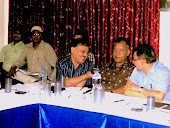Philosophy
(Published in Kshitija Magazine, Roorkee Chapter
All India Nepalese Student Union in BS 2043,Year 2, Vol 2)
Bhim Upadhyaya
Philosophy, though a very familiar word, is not very correctly understood nowadays especially among the younger generation. Thus it is a small attempt to discuss briefly about what is philosophy.
The philosopher's plot deals with the four questions that one of the utmost importance to us all.
What are we?
Where do we come from?
Whither are we going?
How can we best play our allotted part in the story?
The philosophers, in other words, enable us to become better acquainted with ourselves and our proper place in the world.
There is a tendency among some people to fight shy of philosophy. They feel vaguely that a philosopher is a man who is working in a dark room for a black cat that is not there. A cynic has divided all philosophers into two classes, those who learn more and more about less and less until they know every thing about nothing and, less and less about more and more until they know nothing about everything. Yet such an attitude towards philosophy is far from correct. Socrates, as we know, was a great philosopher who was always laughing, that's why he is known as a laughing philosopher. He was martyr to philosophy. And what he asked is philosophy: that process of thought, which enables us to become acquainted with our own personality i.e., know thyself.
In order to help arouse a little bit of interests among the readers, it is worthwhile quoting some saying of a couple of great philosophers.
Schopenhauer:
The distinctly a man knows the more intelligent he is, the more pain he has, the man who is gifted with genius suffers most of all. He that increaseth knowledge therefore increaseth sorrow. Even memory and foresight add to human misery; for most of suffering lies in retrospect and anticipation; pains itself is belief. How much more suffering is caused by the thought of death than death itself! Reading books, the constant streaming in the thoughts of others will most confine and suppress our own and, indeed in the long run paralyze the power of thought.... The inclination of most scholars is land of fuga vacuum (vacuum suction) from the poverty of their minds, which forcibly draws in the thought of others. It is dangerous to read about a subject before we have thought about it ourselves...When we read, another person thinks for us, we merely repeat his mental process...So it comes about that if anyone spends almost the whole day in reading he gradually loses the capacity for thinking... Experience of the world may be looked upon a kind of text with reflection and knowledge from the commentary. Where there is a great deal of reflection and intellectual knowledge and very little experience, the result is like those books which have on each page two lines of text to forty lines of commentary. The first counsel then is, life before books; and the second is, text before commentary. Read creators rather than the expositors and critics. Only from the authors themselves can we receive philosophic thought, therefore whoever feels himself drawn to philosophy must seek out its immortal teachers in still sanctuary of their own works. One of the geniuses is worth a thousand commentaries.
S Radhakrishnan:
Where politics and economics may divide people, and literature make for fellowship, bring people together and close. If we are to establish one world, it can be established through the spread of cultural knowledge of different parts of this world.
Vinoba Bhave:
I have not written one single article in English and yet the news of our movement (Bhudan) has spread far and inside in countries like Germany, France, America and England. The reason is quite clear. The world is hungering to peace. If we sink a well anywhere, the thirsty are bound to know about it, because they realize the need for water.
J Krishnamuti:
If your are not properly educated you will slip into this chaos of world. So what do you thing is education? Is it help to you to fit in to mechanism of the present order, or disorder of things? Or do you think it should be something else? Is your education helping you to be intelligent? I mean to be very sensitive not to your desires, to your own demands, but be sensitive to the world. Surely education is not merely to give you knowledge but also to give you capacity, to look into the world objectively. The function of education is to help to face the world in a totally different intelligent way.
When you have that seed flowering you will keep it going for all your life. But this does not operate, then the world will destroy you. The world makes you what wants you to be a cunning animal. As long as education is concerned merely with the culture of outer... the inner movement with its immense depth will inevitably be for the far and in that there lies great sorrow. Sorrow cannot be solved cannot be understood when your with tremendous energy along ht superficial. Unless you solve this self-knowledge you will have revolt after revolt, reform, which need further reformation and endless antagonism of men against men, will go on. The heart of matter thus is education; it is total understanding of man and not an emphasis of one fragment of his life. All the enthusiasm for outward change always brush aside the more fundamental issues.
With these brief saying of great philosophers of different times of history, I would also like to add one point about the philosophy: It is above all and nothing but the eyes to know oneself.







No comments:
Post a Comment